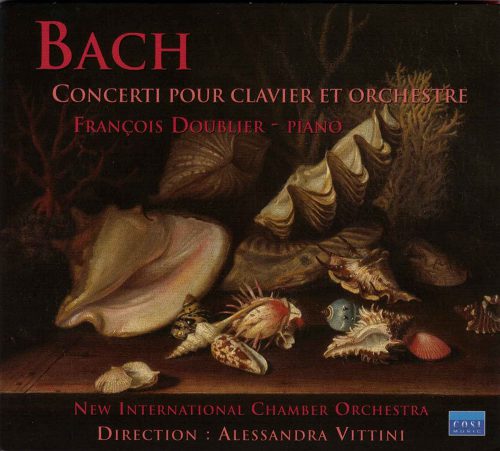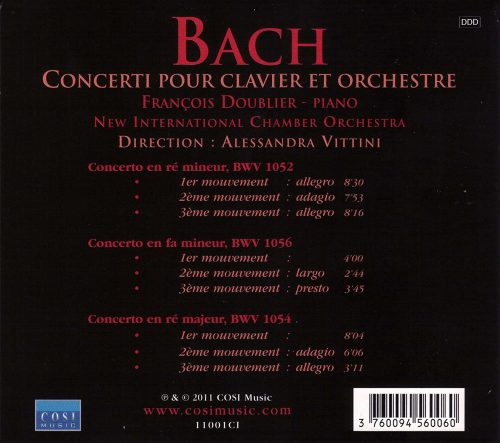BACH (ALBUM)
CONCERTI FOR KEYBOARD AND ORCHESTRA BY J. S. BACH
François DOUBLIER, PIANO
Alessandra VITTINI, CONDUCTOR
NEW INTERNATIONAL CHAMBER ORCHESTRA


Biography of the artists
François Doublier
François Doublier studied at the same time at the university (licence ès lettres classiques and certificate of musicology at the Sorbonne) and in music (1st Prize of the Conservatoire National Supérieur de Musique, Grand Prix de Virtuosité of the Académie Marguerite Long). He began studying the piano at the age of 7 and his teachers included Raoul Gola, Suzanne Roche, Vlado Perlemuter and Jean Micault. After graduating from the Viotti and Pozzoli International Competitions, he met his wife Marie-Christine in Italy, with whom he decided to form a piano duo, which quickly acquired an international reputation. They toured in France, Italy, Belgium, Sweden and especially Germany. Their vast repertoire includes many works of Liszt never played before, as well as works of great contemporary composers that they most often give as first performances (Paul Arma, Georges Auric, Henri Sauguet, Georges Migot, Jacques Castérède, Olivier Messiaen, André Jolivet…). They recorded three discs: one disc “Inédits O.R.T.F.”, one disc for the firm Gasparo USA, one disc “Music for Pleasure” for the firm Pathé Marconi. The death of his wife put an abrupt end to this brilliant career. For several years, François Doublier did not give any more concerts. Recently, he successfully returned to the stage as a soloist. At that precise moment, the musical evening turned into magic. François Doublier’s piano was a Wagnerian orchestra in itself … four curtain calls and a very long final standing ovation from the spellbound audience …”. Daniel Fender, La Montagne, August 2006. Soloist of Radio France, François Doublier has recorded many CDs for COSI Music (Mozart, Rust, Chopin, Wagner, Bach…).
Alessandra VITTINI
List of titles
1 Concerto in D minor, BWV 1052, 1st mvt : allegro
2 Concerto in D minor, BWV 1052, 2nd movement : adagio
3 Concerto in D minor, BWV 1052, 3rd mvt : allegro
4 Concerto in F minor, BWV 1056, 1st mvt
5 Concerto in F minor, BWV 1056, 2nd movement : largo
6 Concerto in F minor, BWV 1056, 3rd movement : presto
7 Concerto in D major, BWV 1054, 1st mvt
8 Concerto in D major, BWV 1054, 2nd movement : adagio
9 Concerto in D major, BWV 1054, 3rd mvt : allegro
Description of the album
Everything has been said about the origin of the concerti that Bach wrote for keyboard and orchestra. What seems important to me is not so much the fact that they are (or would be) adaptations of concerti for other solo instruments (violin, oboe, flute …) composed earlier, even less the fact that they were performed in the summer in Leipzig as part of concerts organized for the Collegium Musicum (of which Bach had taken the direction in 1729) concerts that took place in the garden of the Zimmermann café – but rather the innovative work of the composer. Indeed, in the Baroque period the genre of the concerto for keyboard and orchestra did not exist. J. S. Bach invented it, so to speak. The beginnings of such an elaboration are already present in the 5th Brandenburg Concerto, written around 1721 in Köthen, that is to say 17 years before the composition of the Leipzig concerti.